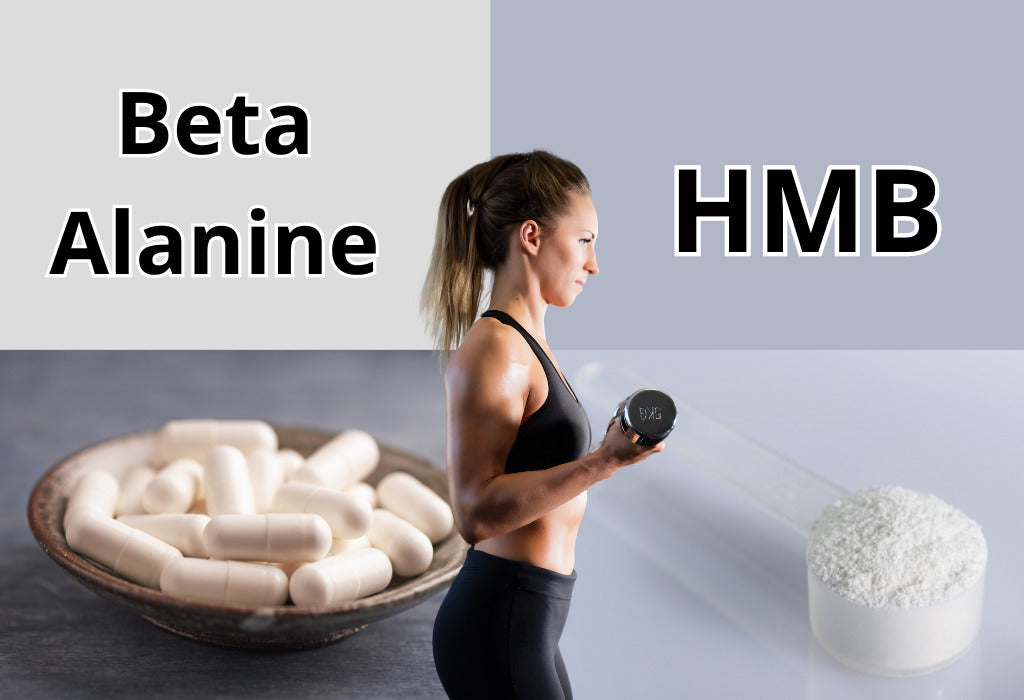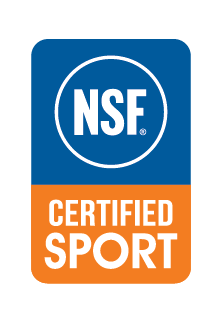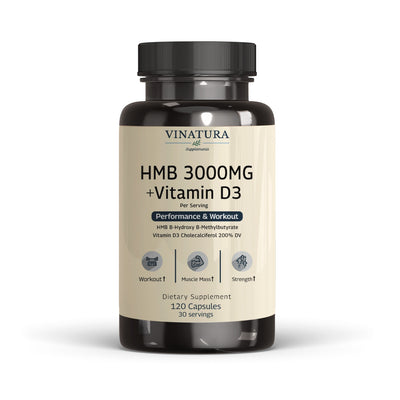
HMB Vs. Beta Alanine: What Should You Choose?
HMB vs Beta Alanine are used as nutritional supplements to improve physical performance and build muscle. Bodybuilders and athletes love both, so should you choose HMB or Beta Alanine to get the best results?
This article will cover their benefits, similarities, and differences so you can choose. Let's follow along.
Before exploring further, please read the disclaimer located at the end of this webpage.
HMB Key Benefits
First, what is HMB?
HMB (β-hydroxy β-methylbutyrate) is a metabolite of the amino acid leucine. It is a nutritional supplement to increase strength and muscle mass associated with resistance exercise.
HMB is believed to have anti-catabolic effects, helping to reduce protein breakdown and muscle cell damage during intense exercise. [1]
HMB ingestion studies in animals and humans show that dietary HMB supplementation is safe and may improve health, strength, and lean body mass, especially in human participants in physical exercise. [2]
The main benefits of HMB can be listed as:
- Reduces muscle breakdown: HMB has been shown to help reduce muscle protein breakdown, helping muscles recover after exercise and increase strength. This helps you train more effectively and improve your sports performance. [1]
- Enhances strength and endurance: HMB may help improve strength and endurance during exercise activities. [1]
Learn more: Can You Take HMB And Creatine Together?
Key Benefits Of Beta Alanine?

So, what about Beta Alanine?
Your body makes a non-essential amino acid called beta-alanine. Unlike most amino acids, it doesn't directly build proteins. Instead, it teams up with another amino acid, histidine, to create carnosine.
This carnosine gets stored in your muscles. Studies have shown that carnosine helps reduce lactic acid build-up during exercise, which can improve your athletic performance. [4], [5]
The main effects of beta-alanine can be listed as:
- Enhanced performance: A carnosine boost may also improve exercise performance, especially during high-energy, prolonged activities. Research has shown that it can help enhance the body's performance and endurance during exercise. [6]
- Enhance endurance: Beta-alanine can increase carnosine concentrations in muscles, helping to slow down the fatigue process and increase exercise endurance. A four-week study with beta-alanine supplementation showed that the cycling time of 20 men on a test increased by about 13–14% until they reached exhaustion. [7]
HMB Vs. Beta Alanine: The Comprehensive Comparison
Similarities Between HMB And Beta Alanine
The similarity between HMB and beta-alanine lies in its benefits to muscles. Both can improve exercise performance and muscle strength. When using these two types, you can enhance muscle recovery after exercise.
Differences Between HMB And Beta Alanine
Although they have similar benefits, HMB and beta-alanine also have their differences.
Effects and Mechanism of Action:
HMB (Hydroxymethylbutyrate): This is a form of the amino acid β-hydroxy β-methylbutyrate, a metabolite of the amino acid leucine.
HMB is believed to aid in muscle strengthening, reduce muscle protein breakdown, and improve physical performance. [1]
It can decompose proteins thanks to inhibiting the ubiquitin-proteasome pathway, an important mechanism in protein decomposition. [8]
Beta-alanine (Beta-alanine): This free amino acid cannot be used for protein synthesis. Beta-alanine is used to increase muscle levels of carnosine, an antioxidant and fatigue repellant in muscles. [3], [4], [5]
Origin and Dosage Form
- HMB: This can be found naturally in some foods high in Leucine and HMB, such as salmon and poultry. Often prepared as derivatives, including HMB-Ca (cálcium salt) or HMB-Free Acid (free acid form) [9].
- Beta-alanine: This may occur naturally in foods such as meat and fish. Often used as a standalone supplement [10].
Read more: Can You Take Leucine And HMB Together?
Applications in Sports and Muscle Strengthening:
- HMB: Often used in workout regimens to strengthen muscles and improve physical performance. It can be used to enhance post-workout recovery. [1]
- Beta-alanine: Often used to enhance muscle strength and endurance during anti-fatigue activities, such as rapid movements or high-intensity workouts. [6] [7]
In summary, HMB and Beta-alanine have different applications and effects supporting muscle strengthening and physical performance.
What Should You Choose: HMB Vs. Beta Alanine?
Choosing between HMB and beta-alanine depends on your specific goals and needs for health and physical performance. Here are some points for you to consider:
- HMB is said to help improve physical performance and muscle strength, increase muscle mass, and reduce fat, especially when combining HMB with a regular and persistent exercise regimen.
- Beta-Alanine is commonly used to improve endurance and prolong exercise, especially in activities focusing on strength and endurance, such as distance running and cardio exercise.
So, if you are looking for increased strength and post-workout muscle recovery, HMB may be a good choice. Beta-alanine may be more suitable if you want to increase endurance and performance during training activities.
Can You Take HMB And Beta Alanine Together?

You can combine HMB and beta-alanine for more comprehensive benefits for muscle health and physical performance. Fitness enthusiasts commonly use these supplements to support muscle health and performance.
Studies have been conducted using HMB and beta-alanine simultaneously, and these two substances have contributed to improving muscle nutrients. When combined, they do not cause significant side effects [11].
Another study combining HMB and beta-alanine reduced protein breakdown in muscles, which can help increase muscle strength and support muscle recovery very well. [12]
And some products combine the two. We would like to not spend too much effort to achieve the best results. Many manufacturers have researched and combined these two types to satisfy our desires. These products will have the appropriate dosage for you to consume daily.
However, before taking any supplements, it's important to consider their risks such as Beta-alanine or HMB side effects.
Other Supplements for Muscle Building
In addition to HMB and beta-alanine, many other supplements, such as creatine, protein, weight gainers, and branched-chain amino acids, can support the muscle-building process.
- Creatine: Increases energy, strength, and muscle growth.
- Protein supplementation: Essential for muscle gain, especially if the diet is inadequate.
- Weight Gainers: These are high-calorie supplements for people with trouble gaining muscle.
- BCAAs (Branched Chain Amino Acids): Important for muscle growth, especially if protein intake is low.
Frequently Asked Questions
Does Beta-Alanine Affect Testosterone?
No, Beta-Alanine is not known to increase or decrease testosterone levels in the body. There has been research showing that beta-alanine supplementation has no significant effect on testosterone levels. In contrast, growth hormone levels increased after exercise for both beta-alanine and placebo groups, and cortisol levels increased after exercise at all times. [13]
Does Beta-Alanine Increase Muscle Growth?
Beta-Alanine may help enhance endurance and performance during exercise but is not a direct factor in enhancing muscle growth. Beta-alanine may benefit body composition by increasing lean muscle mass after three weeks of supplementation. However, some studies found no significant differences in body composition after treatment. [14], [15]
Conclusion
In short, when deciding between HMB and Beta Alanine, consider your training goals and your body's specific needs to choose the most suitable supplement.
At the same time, you can combine HMB and beta-alanine, which can bring the most comprehensive benefits to your health and physical performance. Find out what you need to choose the best dietary supplement.
References
- [1] Slater, G. J., & Jenkins, D. (2000). ??-Hydroxy-F128b-Methylbutyrate (HMB) Supplementation and the Promotion of Muscle Growth and Strength. Sports Medicine, 30(2), 105–116. https://doi.org/10.2165/00007256-200030020-00004/li>
- [2] Nissen, S. L., & Abumrad, N. N. (1997). Nutritional role of the leucine metabolite β-hydroxy β-methylbutyrate (HMB). The Journal of Nutritional Biochemistry, 8(6), 300–311. https://doi.org/10.1016/s0955-2863(97)00048-x/li>
- [3] Guilherme Giannini Artioli, Gualano, B., Smith, A. E., Stout, J. R., & Herbert, A. (2010). Role of β-Alanine Supplementation on Muscle Carnosine and Exercise Performance. Medicine and Science in Sports and Exercise, 42(6), 1162–1173. https://doi.org/10.1249/mss.0b013e3181c74e38/li>
- [4] Wim Derave, Özdemir, M. S., Harris, R. C., Pottier, A., Harmen Reyngoudt, Katrien Koppo, Wise, J. A., & Achten, E. (2007). β-Alanine supplementation augments muscle carnosine content and attenuates fatigue during repeated isokinetic contraction bouts in trained sprinters. Journal of Applied Physiology, 103(5), 1736–1743. https://doi.org/10.1152/japplphysiol.00397.2007/li>
- [5] Trexler, E. T., Smith-Ryan, A. E., Stout, J. R., Hoffman, J. R., Wilborn, C. D., Sale, C., Kreider, R. B., Ralf Jäger, Earnest, C. P., Laurent Bannock, Campbell, B., Kalman, D., Ziegenfuss, T. N., & Antonio, J. (2015). International society of sports nutrition position stand: Beta-Alanine. Journal of the International Society of Sports Nutrition, 12(1). https://doi.org/10.1186/s12970-015-0090-y/li>
- [6] Smith, A. E., Walter, A. A., Graef, J. L., Kendall, K. L., Moon, J. R., Lockwood, C. M., Fukuda, D. H., Beck, T. W., Cramer, J. T., & Stout, J. R. (2009). Effects of β-alanine supplementation and high-intensity interval training on endurance performance and body composition in men; a double-blind trial. Journal of the International Society of Sports Nutrition, 6(1). https://doi.org/10.1186/1550-2783-6-5/li>
- [7] Hobson, R. M., Harris, R. C., Martin, D., Smith, P., Macklin, B., Gualano, B., & Sale, C. (2013). Effect of Beta-Alanine With and Without Sodium Bicarbonate on 2,000-m Rowing Performance. International Journal of Sport Nutrition and Exercise Metabolism (Print), 23(5), 480–487. https://doi.org/10.1123/ijsnem.23.5.480/li>
- [8] Wilson, G. J., Wilson, J. M., & Manninen, A. H. (2008). Effects of beta-hydroxy-beta-methylbutyrate (HMB) on exercise performance and body composition across varying levels of age, sex, and training experience: A review. Nutrition & Metabolism, 5(1). https://doi.org/10.1186/1743-7075-5-1/li>
- [9] Arazi, H., Behzad Taati, & Suzuki, K. (2018). A Review of the Effects of Leucine Metabolite (β-Hydroxy-β-methylbutyrate) Supplementation and Resistance Training on Inflammatory Markers: A New Approach to Oxidative Stress and Cardiovascular Risk Factors. Antioxidants, 7(10), 148–148. https://doi.org/10.3390/antiox7100148/li>
- [10] Trexler, E. T., Smith-Ryan, A. E., Stout, J. R., Hoffman, J. R., Wilborn, C. D., Sale, C., Kreider, R. B., Ralf Jäger, Earnest, C. P., Laurent Bannock, Campbell, B., Kalman, D., Ziegenfuss, T. N., & Antonio, J. (2015). International society of sports nutrition position stand: Beta-Alanine. Journal of the International Society of Sports Nutrition, 12(1). https://doi.org/10.1186/s12970-015-0090-y/li>
- [11] Garvey, S. M., & Desai, J. (2016). Effects of HMB and beta‐alanine co‐supplementation and running wheel activity on skeletal muscle morphometry and metabolomics in aged rats. The FASEB Journal, 30(S1). https://doi.org/10.1096/fasebj.30.1_supplement.271.4/li>
- [12] Dietary HMB and β-alanine co-supplementation does not improve in situ muscle function in sedentary, aged male rats. (2015). Applied Physiology, Nutrition, and Metabolism. https://cdnsciencepub.com/doi/abs/10.1139/apnm-2015-0391/li>
- [13] Hoffman, J., Ratamess, N. A., Ross, R., Kang, J., J. Magrelli, Neese, K., Faigenbaum, A. D., & Wise, J. A. (2008). β-Alanine and the Hormonal Response to Exercise. International Journal of Sports Medicine, 29(12), 952–958. https://doi.org/10.1055/s-2008-1038678/li>
- [14] Glenn, J. M., Gray, M., Stewart, R. W., Moyen, N. E., Kavouras, S. A., Ro DiBrezzo, Turner, R., Baum, J. I., & Matthew Steven Stone. (2016). Effects of 28-Day Beta-Alanine Supplementation on Isokinetic Exercise Performance and Body Composition in Female Masters Athletes. The Journal of Strength and Conditioning Research, 30(1), 200–207. https://doi.org/10.1519/jsc.0000000000001077/li>
- [15] Kendrick, I. P., Harris, R. C., Hyo Jeong Kim, Chang Keun Kim, Dang, V. H., Lam, T. Q., Bui, T. T., Smith, M., & Wise, J. A. (2008). The effects of 10 weeks of resistance training combined with β-alanine supplementation on whole body strength, force production, muscular endurance and body composition. Amino Acids, 34(4), 547–554. https://doi.org/10.1007/s00726-007-0008-3
Author

Product Disclaimer
Including an ingredient or study does not evaluate, endorse, or recommend any Vinatura product or any third-party product. Some ingredients discussed may not be used in any Vinatura product.
The content of the articles has not been evaluated by the Food and Drug Administration (FDA) and is not intended to promote or endorse any specific product. Any products sold on this website are not intended to diagnose, treat, cure, or prevent any disease.
Opinions and Endorsements
Any claims, statements, or opinions expressed in the articles are those of the author(s) and do not necessarily reflect the views or opinions of the manufacturers of the dietary supplement products. The products sold on this website are separate from the content of the articles and are not directly endorsed or associated with the information presented here.
Liability Disclaimer
The author(s) of the articles, website, and manufacturers of the dietary supplement products do not assume any liability for any potential consequences arising from the use of the information provided in the articles. Ingredient effects, dosages, and safety vary by individual, formulation, and context; some ingredients interact with medications or may be unsuitable during pregnancy or lactation. It is recommended that individuals consult with a qualified healthcare professional before making any dietary or lifestyle changes, including the use of dietary supplements.
Product Usage
Please refer to the product labels and packaging for specific usage instructions and guidelines for the dietary supplement products sold on this website.
Customer Support
For any concerns or questions regarding the dietary supplement products, please contact our customer support team, who will be more than happy to assist you.






Leave a Comment
Be the first to comment.
What do you think?